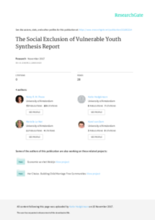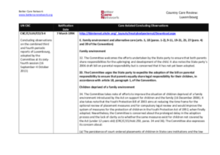

Displaying 231 - 240 of 412
In this study, the researchers asked youth (formerly) in family foster care to indicate their psychosocial needs, and analyzed if youth with a history of sexual abuse have different needs.
This study sought to investigate similarities and differences in maltreatment in siblings and risk factors associated with the maltreatment of more than one child from the same family.
This study aimed at investigating prevalence and precursors of breakdowns in long‐term foster care, the duration of placement before breakdown, and the association of child and placement characteristics with breakdown.
This report presents the results of a scientific research on the topic of Social Exclusion of Vulnerable Youth, commissioned by SOS Children’s Villages Netherlands.
The goal of this three-wave longitudinal study was to analyze foster parent stress and foster children’s internalizing and externalizing behaviors in a transactional framework.
Similarities and differences in the (short-term) psychosocial development of children in foster care, family-style group care, and residential care were investigated in a sample of 121 Dutch children one year after their initial placement.
Concept mapping was used to identify the needs of grandparents who take care of their grandchildren in formal foster care in Flanders (Dutch speaking part of Belgium).
This paper explores practical and ethical dilemmas for professionals when securing the protection of children in the complex non‐clinical setting of individual families.
This country care review includes the care-related Concluding Observations adopted by the Committee on the Rights of the Child and the Committee on the Rights of Persons with Disabilities.
The focus of ISSA's three-day 2017 Conference: Local Responses, Global Advances: Towards Competent Early Childhood Systems will examine how the speed of change in today’s world requires substantial shifts in the ways early childhood systems are designed, equipped, governed, financed and supported. The 2017 ISSA Conference will unite the knowledge and practice of researchers, practitioners, policy makers, parents and NGOs from around the world to explore early childhood themes through insightful discussions and interactive sessions, while sharing their wisdom and solutions.


